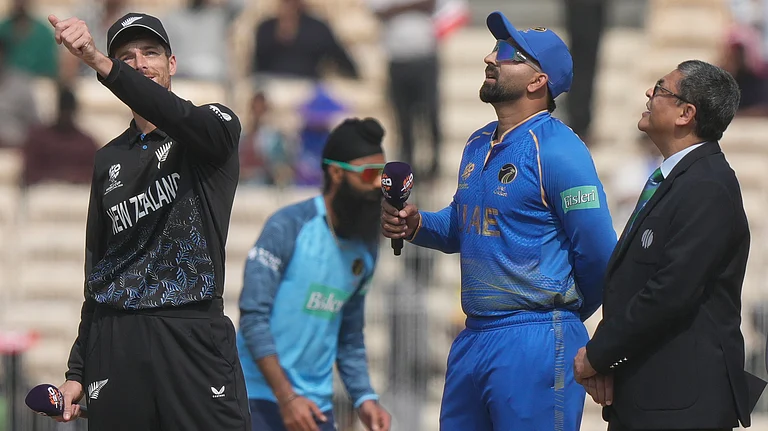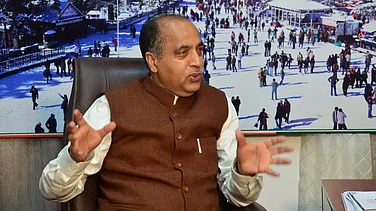Home minister L.K. Advani has always been a frontline strategist, helming the BJP's march from a dismal two seats in Parliament to its commanding position today. His own strategic line led him, in government, to cede primacy to A.B. Vajpayee and 'graciously' take on a subservient role. In the first heady days of power, the party faithful even called him the 'real' number one, the "true leader" who'd plucked Vajpayee out of political lethargy and given him the top job. Vajpayee was seen as a compromise to coalition politics, and Advani was projected as the man who would not be PM. He was the kingmaker who put the party before personal ambition.
But in the two-and-a-half years the BJP has been in power, there's been a subtle shift in power equations. The personality-centric politics may have brought in rich electoral dividends for the BJP but it also spawned the larger-than-life Vajpayee persona, eclipsing all rivals in the BJP. Vajpayee emerged as the pivot of the BJP's politics; Advani paled into relative insignificance.
This was never brought into such sharp relief as when Vajpayee refused to appoint a 'stand-in' during his convalescence in Mumbai. It wasn't just that an ailing PM resented the question of succession. There was a political signal: the suspicion, now hardening into certainty, is that he doesn't want Advani to succeed him. Instead, Vajpayee is believed to be grooming external affairs minister Jaswant Singh for the job.
All this covert sign language soon spilled over into the open. The result: the biggest, and most transparent, display of mutual attrition, posturing and jockeying for control that the BJP has seen at the top. The media was deluged with well-aimed, scarcely disguised hints and barbs. To illustrate: Advani took his now-famous dig at Jaswant for the Kandahar crisis as high-profile columnists projected the latter as the only BJP leader with adequate liberal credentials to be PM. Then again, Advani visited the RSS camp in Agra and issued statements praising the Sangh, and Bangaru Laxman was prompt with his disclaimer, made apparently at Vajpayee's behest.
Advani's camp feels the PM's coterie is going all out to checkmate the home minister. One loyalist called it the "scorched earth" policy where Vajpayee would make every move to keep Advani out even if it meant destroying the BJP. They believe the PM has been extremely unfair to his old political associate. Says a BJP minister: "On the one hand you have Advani making Vajpayee the PM and downplaying himself, on the other you have the PM doing everything to undermine him." Advani loyalists cite the fact that he's functioning as the number two, conducting meetings with ministers etc. Asks a senior leader: "Why can't Vajpayee be generous enough to make it official?"
But it's not the Advani camp alone which is unhappy. The Race Course Road circle too nurses similar feelings for India's Iron Man II for suddenly seeking the media limelight while the PM was in Mumbai. By making statements about the Sangh's authority over the BJP, Advani is ensuring the organisation's backing in the succession sweepstakes. As a consequence, BJP leaders began issuing statements about Advani being the only possible successor to Vajpayee, even as the PM recuperated at Breach Candy. Through the fortnight, Advani has clearly been trying to reinvent himself-and it has sparked further suspicion in the PM's camp.
Some pmo officials even saw a political design in Advani addressing the press after visiting Vajpayee at the hospital. Indeed, the level of paranoia in the pmo appeared to increase even as Vajpayee's health problems mounted. The level of mistrust only appears to have worsened in these last few weeks when the PM shifted base to Mumbai. Advani did not help matters by breaking months of silence and giving a series of TV interviews, ostensibly on the BJP completing a year in office. It was in one such interview that he lit into Jaswant on the IC 814 episode-a remark interpreted as a putdown for the ambitious Vajpayee deputy. The muted 'antagonism' between the two most powerful figures in the land had clearly entered a more nervy phase.
As for Jaswant, BJP-RSS old-timers dismiss it as a joke. A party veteran put it succinctly: "You know that an individual like Jaswant can never be acceptable in a cadre-based party like ours. Only people who do not know the BJP can believe such nonsense." Asserting the BJP won't let Vajpayee foist Jaswant on the party, senior leader J.P. Mathur remarked that the suave foreign minister can become the president of the US but not India's prime minister. As far as Mathur is concerned, "after Vajpayee there is only Advani for the BJP".
Vice-president Jana Krishnamurthy is more circumspect: "Why talk about succession when the PM is fine? Everyone knows that Vajpayee and Advani are the two outstanding leaders of our party. Advani's contribution in building the party is unique. He is an intellectual with a thorough grasp of political trends. That is why he is a master strategist. But at the same time he is also someone who has endeared himself to the cadres." Is he then the chosen successor to Vajpayee? "Why take names. But when this issue has to be decided, I can assure you that the parliamentary party will not take more than half-an-hour to decide. They will choose the right person." There are no prizes for guessing whom Krishnamurthy considers the "right person". On the pro-US lobby propping up Jaswant Singh, Krishnamurthy responds: "Does any country choose its PM on the advice of another country? If the Americans respect Jaswant it is because he is foreign minister under Vajpayee and any foreign minister under Vajpayee will be respected."
Even the so-called Vajpayee loyalists plump for Advani. The BJP president Bangaru Laxman told Outlook: "Advani is the undisputed leader of the party. Look at his contribution to the growth of the BJP. When he took over as party president, the BJP had just two MPs. When he laid down office there were 86 MPs." But Laxman sees no need to depute a number two. "Why should there be any such announcement when the PM was conscious during the surgery? But in India, such talk is inevitable. After Nehru, who? after Indira, who? But why get into names now when Atalji is hale and hearty."
Laxman also tries to put to rest speculation that he differed from Advani's line on the RSS at the behest of the prime minister. "When Advani describes the RSS position as being similar to that of Gandhiji's vis-a-vis the Nehru regime, he is quite right. But Gandhi's influence did not compel Nehru to impose total prohibition and the five-year plans continued. Similarly, we function independently of the RSS," says he.
THE allies themselves are understandably reluctant to commit themselves on the succession issue right now. While the BJP may be with Advani, the allies may have ideas of their own. The TDP, the BJP's most prominent ally, has a high-profile leader in Chandrababu Naidu, who himself has ambitions of becoming prime minister. That is why TDP leader in the Lok Sabha K. Yerran Naidu says that the party's position will depend on "how the entire political scenario emerges at that time". But other TDP MPs say that while there might be some rumblings against Advani, the general consensus will be to go along with the choice of the largest constituent of the NDA.
The Samata Party too has a prime ministerial aspirant in George Fernandes. As a result, party leader Jaya Jaitly says that any talk about a number two is motivated. "Where is the question of a number two. There is no constitutional provision for it. The PM is in fine fettle except for a knee problem." She believes that "the secularists" are raising a non-issue to corner Advani.
The compulsions before Mamata Banerjee and her Trinamul Congress are different. With Muslims constituting a large percentage of the West Bengal electorate, Mamata's support for Advani will depend on the situation at that time. At a personal level, she has an excellent rapport with Advani. But as a Trinamul MP says: "She can't afford to be painted a communalist so her allegiance lies with Vajpayee and not the BJP."
The Shiv Sena on the other hand would be delighted to have Advani as the prime minister. Bal Thackeray openly supports Advani for the number two slot. Sena leader Manohar Joshi reveals that "some time ago when there was informal talk about this in the party, Advani's name was proposed and accepted by all. So whenever necessary, the Sena will back Advani". As for Jaswant Singh's acceptability, Joshi is dismissive: "Jaswant Singh's name has not even come up. We have never thought of anyone besides Advani as filling the slot after Vajpayee."
The BJP believes if and when Advani does have to succeed Vajpayee, there is no reason to expect that serious turbulence will ensue with the NDA. Particularly as Advani, much more than Vajpayee, was the key figure in working out the alliances in both 1998 and 1999. Certainly, there are the odd NDA leaders who may make a bid for the prime ministership themselves. But as the sizes of their parties do not match their ambitions, such a bid is unlikely to succeed. But even within the BJP there are other contenders besides Jaswant Singh, like Murli Manohar Joshi.
While Advani commands the backing of the BJP, and his camp believes that allies can be managed when necessary, his biggest failing is his inability to secure the backing of the prime minister. In all fairness to Advani, he has never openly challenged Vajpayee. On the contrary, for the two-and-a-half years that the BJP has been in power, Advani has been content to play second fiddle to Vajpayee, going out of his way to back the prime minister even on such prickly issues as economic reforms on which he could have exploited the sharp difference of opinion between the RSS and the government. Advani has also watched helplessly as the rules about the careful division of power between organisation and government were broken as the PM repeatedly stepped on Advani's turf in an effort to increase his control over the BJP's organisational apparatus.
If Advani has acquiesced quietly to all of Vajpayee's decisions, it's because he has been compelled to reinvent himself as a moderate acceptable to the allies in a post-Vajpayee scenario. To set himself on a collision course with the prime minister would be the undoing of that project. Yet in spite of maintaining a low profile and going along with all of Vajpayee's decisions, the Race Course Road coterie that surrounds the PM remains extremely suspicious of every move made by the home minister and his friends in the BJP and the Sangh.
Unfortunately for Advani, there is only one man who can ensure that he succeeds Vajpayee. That's Vajpayee himself.
























